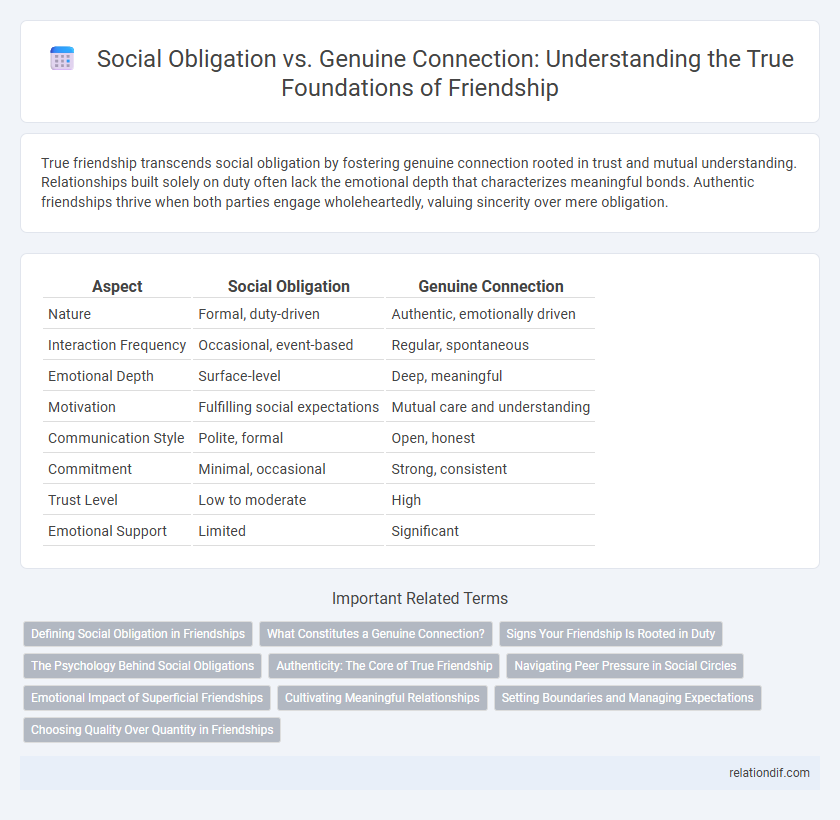True friendship transcends social obligation by fostering genuine connection rooted in trust and mutual understanding. Relationships built solely on duty often lack the emotional depth that characterizes meaningful bonds. Authentic friendships thrive when both parties engage wholeheartedly, valuing sincerity over mere obligation.
Table of Comparison
| Aspect | Social Obligation | Genuine Connection |
|---|---|---|
| Nature | Formal, duty-driven | Authentic, emotionally driven |
| Interaction Frequency | Occasional, event-based | Regular, spontaneous |
| Emotional Depth | Surface-level | Deep, meaningful |
| Motivation | Fulfilling social expectations | Mutual care and understanding |
| Communication Style | Polite, formal | Open, honest |
| Commitment | Minimal, occasional | Strong, consistent |
| Trust Level | Low to moderate | High |
| Emotional Support | Limited | Significant |
Defining Social Obligation in Friendships
Social obligation in friendships refers to interactions driven primarily by societal expectations rather than authentic emotional bonds. These obligations often manifest as routine check-ins or attending events out of a sense of duty instead of genuine desire. Differentiating social obligation from true connection requires awareness of mutual interest, shared values, and spontaneous support beyond obligatory gestures.
What Constitutes a Genuine Connection?
A genuine connection in friendship is built on mutual trust, empathy, and authentic communication rather than mere social obligation or surface-level interactions. True friends prioritize understanding and supporting each other's emotional needs without expecting anything in return, fostering a deeper and more meaningful bond. Consistent presence and shared experiences strengthen the connection, differentiating it from superficial relationships maintained out of habit or societal pressure.
Signs Your Friendship Is Rooted in Duty
A friendship rooted in duty often features a lack of enthusiasm, where interactions feel more like obligations than genuine enjoyment. Communication tends to be infrequent and surface-level, with little effort to share personal thoughts or emotions. When favors or support feel transactional rather than heartfelt, it indicates the relationship may be driven by social obligation instead of authentic connection.
The Psychology Behind Social Obligations
Social obligations in friendships often stem from societal norms and expectations that dictate maintaining contact or reciprocating favors regardless of personal feelings. Psychological theories, such as social exchange theory, explain these obligations as a perceived need to balance give-and-take to avoid feelings of guilt or social rejection. Genuine connection, however, is characterized by authentic emotional bonds that motivate interaction beyond external pressures or duty.
Authenticity: The Core of True Friendship
Authenticity lies at the heart of true friendship, where sincere emotions and mutual trust replace superficial social obligations. Genuine connections thrive on honest communication and shared values, fostering deeper emotional support and lasting bonds. Friends rooted in authenticity prioritize understanding each other's true selves over mere social expectations.
Navigating Peer Pressure in Social Circles
Navigating peer pressure within social circles requires distinguishing social obligation from genuine connection, as true friendships are built on mutual respect and authenticity rather than conformity. Recognizing when actions stem from authentic care instead of obligation helps maintain emotional well-being and fosters deeper, trust-based relationships. Establishing boundaries and prioritizing meaningful interactions enables individuals to resist negative influence and cultivate a supportive social environment.
Emotional Impact of Superficial Friendships
Superficial friendships often create a sense of social obligation rather than genuine emotional support, leading to feelings of loneliness and dissatisfaction. These relationships lack depth, causing individuals to experience emotional exhaustion and a diminished sense of belonging. Authentic connections foster trust and empathy, essential for emotional well-being and resilience.
Cultivating Meaningful Relationships
Cultivating meaningful relationships requires prioritizing genuine connection over social obligation, fostering trust and mutual understanding. Authentic friendships thrive on empathy, active listening, and shared experiences rather than superficial interactions driven by societal expectations. Building bonds rooted in sincerity enhances emotional well-being and creates lasting support networks.
Setting Boundaries and Managing Expectations
Setting boundaries in friendship helps differentiate social obligations from genuine connections, ensuring emotional well-being is preserved. Clear communication about personal limits manages expectations, preventing resentment and fostering mutual respect. Prioritizing authentic interactions over obligatory meetings strengthens trust and deepens meaningful relationships.
Choosing Quality Over Quantity in Friendships
Prioritizing genuine connection over social obligation fosters deeper, more meaningful friendships that enhance emotional well-being and trust. Quality friendships, characterized by mutual support and authenticity, significantly outperform numerous superficial contacts in providing long-term satisfaction and resilience. Investing time and energy into a few trusted friends strengthens bonds and promotes a more fulfilling social life.
Social obligation vs genuine connection Infographic

 relationdif.com
relationdif.com